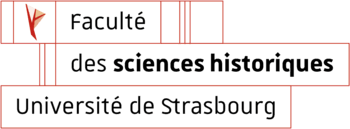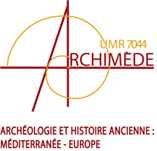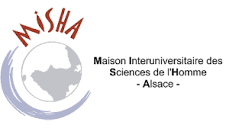 |  |  |
YOUNG RESEARCHERS WORKSHOP – CALL FOR PAPERS
“Funerary practices and identity/ies”
17th and 18th of November 2020, University of Strasbourg
The passing of an individual in a community generally leads to the implementation of a complex funerary operational chain repeated upon each death. This behaviour can therefore be opposed to non-funerary deposits, characterized by the absence of funerals and/or of a dedicated tomb (corpse rejection or abandonment, burial deprivation - BOULESTIN 2016). The study of a given group’s “practice” (ibid.) and of its variability allows to identify differences in the deceased’s treatment and to grasp some aspects of the society of the living. Rituals and funerals – which are difficult to assess in the case of pre- and protohistoric populations - as well as funeral gestures, thus reveal one or several of the deceased’s identities. They can consist of their individual identity, related for instance to their sex, age or social status, or of their collective identity, which is “lived and produced” (LENCLUD 2008) and refers to their belonging to a group. In the latter case, the role of a funerary practice is to maintain the links between its actors and to ensure its own continuity.
Death and the events gravitating around its occurrence lead to social interactions and specific gestures which have questioned philosophers. Among their views, practice (praxis) holds a dialectic relationship with theory. This leads to distinguish the practice of philosophy from practical philosophy, which contributes to question and act on the funerary domain. In this case, the theory on death can take a practical shape within the framework of funerals, of the expression of beliefs and of collective or individual reflections, which can be linked to specific cultures or educations (HABERMAS 2008). The dead brings the individual and its community face to face with the unknown and with metaphysical questioning. It pushes them to establish a series of practices and narratives dispelling fear, but also defilement caused by the dead body (ILDEFONSE 2012).
***
Organised by the UMR 7044 ArcHiMedE of the University of Strasbourg (Unistra), this workshop is addressed to PhD students and PhD working in the fields of Archaeology, History, History of religions, Sociology, Anthropology, Ethnology, Philosophy, Theology and Classics. Communications will have a length of 20 minutes and will be followed by 10 minutes of discussion with the audience. They have to examine funerary practices of a past or present population in an unlimited geographical area focusing on identity/ies. They will rely on textual, archaeological and iconographical data, and/or field observations.
They will be centered on three axes:
1. Rituals and funerals: body preparation, ceremony/ies, actor(s), function(s), sacrifice(s), etc.;
2. The deceased: age, sex, pathologies, corpse treatment and position, re-intervention on the corpse, etc.;
3. The tomb: typology, context, architecture, specific planning, container, signalling system, material, etc.
Communication proposals (maximum of 3 000 signs) will be sent in French or English to jdeidentite@gmail.com before the 5th of April 2020 with a résumé. Communications chosen by the scientific committee will be announced at the end of April 2020. They can be subject to publication.
Scientific committee : Noisette BEC DRELON (PhD in Prehistory, associate member of the UMR 7269 LAMPEA, associate member of the UMR 7044 ArcHiMedE) ; Guillaume DUCOEUR (Lecturer in History of Religions of Oriental and Asian civilizations, UMR 7044 ArcHiMedE) ; Séverine BLIN (Research fellow at the CNRS, associate member of the UMR 7044 ArcHiMedE) ; Fanny CHENAL (anthropologist, INRAP) ; Michele CUTINO (Professor of Ancient Church History, UR 4377) ; Salomé DEBOOS (Lecturer in Ethnology, UMR 7363 SAGE) ; Sylvie DONNAT (Lecturer in Egyptology, UMR 7044 ArcHiMedE) ; Michel HUMM (Professor of Roman History, UMR 7044 ArcHiMedE) ; Régine HUNZIKER-RODEWALD (Professor of Old Testament, UR 4378) ; Christian JEUNESSE (Professor emerita of Prehistory, UMR 7044 ArcHiMedE) ; Angélique LABRUDE (PhD in Aegean Protohistory, associate member of the UMR 7044 ArcHiMedE) ; Denis MONNERIE (Professor emerita of Ethnology, UMR 7367 DynamE) ; Virginie MULLER (Lecturer in Assyriology, Laboratoire Archéorient) ; Philippe QUENET (Professor of Archaeology of Ancient East, UMR 7044 ArcHiMedE) ; Anne-Caroline RENDU LOISEL (Lecturer in Assyriology and Archaeology of Ancient East, UR 7044 ArcHiMedE) ; John SCHEID (Honorary Professor of Roman Religion, Institutions and Society, Collège de France) ; Aline TENU (Research fellow at the CNRS, associate member of the UMR 7041 ArScAn) ; Jean-Luc VIX (Lecturer in Greek Philology, UR 3094 CARRA).
Organizing committee: Juliette FLOQUET (PhD student in Archaeology of Ancient Near East - UMR 7044); Corentin VOISIN (agrégé of History, PhD student in Ancient History - UMR 7044); Laura WALDVOGEL (PhD student in Prehistory - UMR 7044).
Bibliographic references:
ALBERT, J.-P., 1999, « Les rites funéraires. Approches anthropologiques », Les cahiers de la faculté de théologie, pp. 141-152.
BAUDRY, P., 2005. « La ritualité funéraire », HERMÈS 43, pp. 189-194.
BOULESTIN, B., 2016, « Norme funéraire : illusions et vérités », in LAUWERS, M. & ZEMOUR A. (dir.), Qu’est-ce qu’une sépulture ? Humanités et systèmes funéraires de la Préhistoire à nos jours. Antibes, pp. 363-377.
BOULESTIN, B., 2012, « Champ de la discipline : concepts et mise en oeuvre », in BONNABEL L. (dir.), Archéologie de la mort en France, Paris, pp. 24-41.
BOULESTIN, B. & DUDAY, H., 2005, « Ethnologie et archéologie de la mort : de l’illusion des références à l’emploi d’un vocabulaire », in MORDANT, C. & DEPIERRE, G. (éd.), Les pratiques funéraires
à l’âge du Bronze en France, Actes de la table ronde de Sens-en-Bourgogne (Yonne), pp. 17-35.
CHESSON, M. S, 2001, « Social Memory, Identity, and Death: An Introduction », dans CHESSON M. S. (éd.), Social Memory, Identity, and Death: Anthropological Perspectives on Mortuary Rituals. Anthropological Perspectives on Mortuary Rituals, American Anthropological Association n°10, pp. 1-10.
DUDAY, H. & al., 1990, « L'Anthropologie « de terrain » : reconnaissance et interprétation des gestes funéraires », Bulletins et Mémoires de la Société d'anthropologie de Paris 2/3-4, pp. 29-49.
FAHLANDER, F. & OESTIGAARD T., 2008, « The Materiality of Death: Bodies, Burials, Beliefs », in FAHLANDER, F. & OESTIGAARD T. (éd.), The Materiality of Death: Bodies, Burials, Beliefs. Oxford : Archaeopress, pp. 1-18.
FERRET, C., 2011, « L’identité, une question de définition », Cahiers d’Asie centrale 19-20, pp. 459-461.
HABERMAS, J., 2008, « Sur le rapport de la théorie et de la pratique », Les Études philosophiques 87, pp. 487-498.
ILDEFONSE, F., 2012, Il y a des dieux, Paris.
LECLERC, J., 1990, « La notion de sépulture », Bulletins et Mémoires de la Société d'anthropologie de Paris 2/3-4, pp. 13-18.
LECLERC, J. & TARRETE, J., 1988, « Sépulture », in LEROI-GOURHAN, A. (éd.), Dictionnaire de la Préhistoire ou les Voies de l’Homme, pp. 99-114.
LENCLUD, G., 2008, « Identité et identités », L’Homme 187-188, pp. 447-462.
NILSSON STUTZ, L. & TARLOW, S. (éd.), 2013, The Oxford Handbook of Death and Burial, Oxford University Press, Oxford, 849 p.
TESTART, A., 2004, La Servitude volontaire. 1 : Les morts d’accompagnement ; 2 : L’origine de l’État, Paris.

Comments0
Please log in to see or add a comment
Suggested Articles



